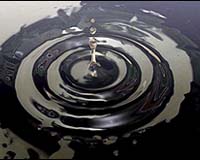 |
Los Angeles (AFP) June 16, 2010 The United States government must perform a careful balancing act as it considers how to sanction BP over the Gulf oil disaster without tipping the energy giant into insolvency, analysts say. Under intense pressure from President Barack Obama, BP on Wednesday announced the setting up of a 20-billion-dollar fund for spill victims as the company outlined a series of belt-tightening measures to cope with the crisis. Yet pressure groups and legal experts say BP could be hit with tens of billions of dollars in civil penalties and lost government contracts and may even be barred from operating independently off the US coast altogether. Robert Weissman, president of the Public Citizen watchdog, urged the government to throw the book at BP -- debarring it from lucrative contracts, banning it from drilling offshore and imposing the heaviest fines possible. BP was the Pentagon's top fuel supplier in fiscal 2009, accounting for 11.7 percent of its fuel contracts, worth an estimated 2.2 billion dollars. Weissman said it was the kind of contract BP deserved to lose. "The idea of the statute is 'Should the government be contracting with entities that are going to produce those goods and services in a way that violates the law?" Weissman told AFP. "You cannot be certain dealing with BP right now that that's not going to happen so there's a very good reason for the government to undertake the debarment." However Michael Wara, an expert in environmental law at Stanford Law School, cautioned that any debarment would have to be made in the public interest. "Debarment is not supposed to be used as punishment," he said. "If they're not a safe operator, if they commit fraud, if they're reckless then the government might consider debarring a firm but they also have to consider the cost to the government of doing so. "In this case BP is one of the major suppliers of military jet fuel and is the largest domestic of oil and gas within the United States. So debarring BP might have harmful effects for the US economy." Wara said the Obama administration was likely to have used the prospect of debarment as leverage in talks with BP executives to set up the multi-billion-dollar escrow fund announced Wednesday. Obama's description of BP as "reckless" in his first Oval Office address on Tuesday was also significant, Wara said, signalling that the administration was ready to punish the company to the fullest extent if necessary. "President Obama indicated his perspective on what happened when he used the term 'reckless'. I don't think that was accidental," Wara said. If BP was found to have acted recklessly rather than negligently, the company will be exposed to civil liabilities far in excess of the existing multi-million dollar cap, Wara said. "If they're reckless, that's quite a bit worse than negligent." Civil fines under the Clean Water Act could reach 10 billion dollars, Wara added. Oil industry groups are urging for any penalties by the US government to take into account BP's status as an employer of 23,000 people. "Our hope is that no matter what actions are taken it's done in an informed manner and recognizes the jobs that are created," Erik Milito, an official with the American Petroleum Institute, told National Public Radio. The Obama administration had a vested interest in ensuring BP survived as an entity in order to continue to foot the bill for clean-up costs, compensation and restoration for years to come, Wara added. "They have to be careful in balancing the sanction," he said. "The United States has a real interest in keeping BP and BP America around as viable deep pockets from which to extract money." Weissman said he feared that BP might "jump into bankruptcy" to escape its debts rather than be pushed into bankruptcy. "It's why the demand to put the money in escrow is a good one," he said. "Because there are very serious reasons to be concerned about maneuvers BP may undertake over time to avoid paying all that it owes."
Share This Article With Planet Earth
Related Links Powering The World in the 21st Century at Energy-Daily.com
 Kuwait Looking To Tap Canadian Expertise In Developing Heavy Oil Resources
Kuwait Looking To Tap Canadian Expertise In Developing Heavy Oil Resourcesby Lauren Krugel Calgary, Canada (SPX) Jun 17, 2010 Canada has the expertise petroleum-rich Kuwait needs to develop heavy oil resources in the Mideast country, which has been looking for ways to keep up long-term production, said a top engineer with Kuwait Oil Co. "We thought the good practice is to be close to the champion, or the leaders in this area," Bader Al-Matar, senior reservoir engineer with the ... read more |
|
| The content herein, unless otherwise known to be public domain, are Copyright 1995-2010 - SpaceDaily. AFP and UPI Wire Stories are copyright Agence France-Presse and United Press International. ESA Portal Reports are copyright European Space Agency. All NASA sourced material is public domain. Additional copyrights may apply in whole or part to other bona fide parties. Advertising does not imply endorsement,agreement or approval of any opinions, statements or information provided by SpaceDaily on any Web page published or hosted by SpaceDaily. Privacy Statement |